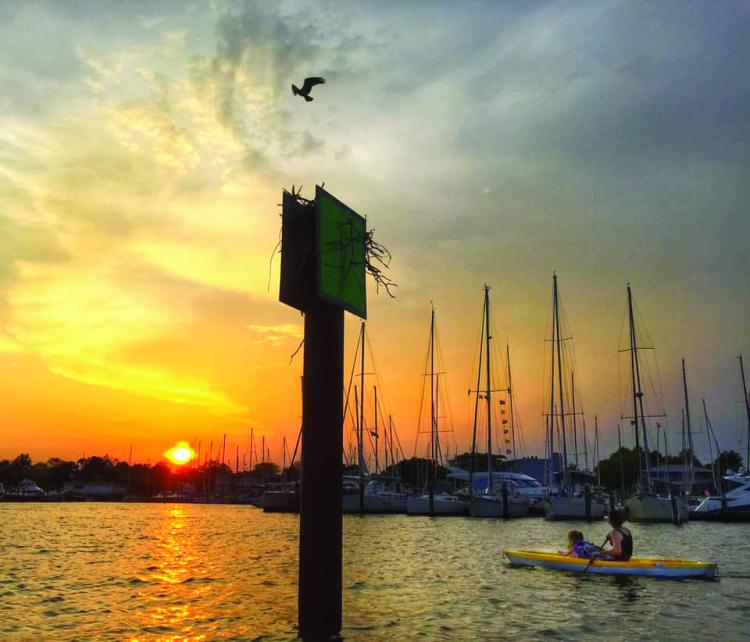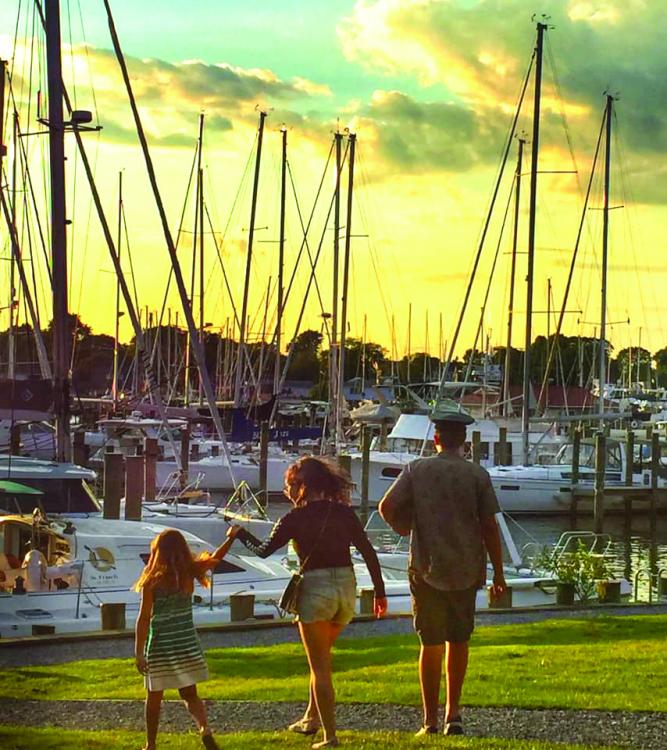What people don't get about living aboard a boat
Even though I am a sailor, I lived on a 42-foot powerboat on the Chesapeake for 10 years. It was wonderful. It was also cramped, sometimes damp, and inconvenient.

I worked at a nine-to-five job, had pets, a husband, hobbies, creature comforts—all elements of a traditional lifestyle. Despite this, my friends, family, coworkers and acquaintances were intrigued by what they perceived as an irrational decision. How did I stay warm? How did I get to work? Are you able to watch Netflix? Am I sick of drinking rum?
I asked a few fellow liveaboards if they, too, encountered a myriad of questions and had to dispel many myths about living afloat, either on a sailboat or powerboat. Here are some of our favorites:
It’s all rum drinks, relaxation, and romantic sunsets
You’re on a boat, so that means there’s a constant stream of Jimmy Buffett tunes as we live like it’s always happy hour. In fact, our boat is our home, and therefore as home/boat owners, we have a running list of maintenance projects and household chores. Boat plumbing systems tend to be less reliable than their house counterparts. We tend to spend hours upkeeping the hoses, heads, bilges, and pipes. If it snows, all this becomes much more urgent to make sure nothing freezes. It does take electrical systems knowledge and engine repair skills, lest you want to hire a professional for each unrecognizable sound or smell.

Some mundane tasks become more onerous once living on the water such as laundry. Most liveaboards have to use laundromats, which to me is the biggest downside to this otherwise appealing lifestyle. If you don’t have a working shower or are conserving water, showering means walking down the dock to the marina head, sometimes in the middle of the winter on icy or snowy docks.
This is not to say we don’t drink dark ’n stormies on the aft deck with friends occasionally, or every Thursday through Sunday night. It means the rum is poured when the chores are done.
We are gypsies, hippies, or pirates
Most liveaboards I know have impressive careers, commute to work, go to the gym, attend birthday parties and holiday dinners, have a 401k, a dental plan, a crockpot, and bathe regularly. There’s a misconception that we all must be free spirits, waiting for the next breeze to set sail to our next destination.
While that may be true for some, many of us are tethered to land by our family and jobs. We cook pancakes and bacon on Sundays, read books (mostly on screens, as books take up precious storage space), and go to PTA meetings. Albeit, we may just pull the lines on a balmy Thursday after work and go for a sunset sail, or motor to St. Michaels for the weekend. While we are not gypsies, we may be better compared to turtles that can take their home wherever they go.
It’s a cheap lifestyle
Compared to a mortgage on a 2500-square-foot home and the associated costs, boat life is cheaper. Compared to renting a small apartment, living aboard may be the less expensive option. Either way, it is not a free ride. Consider we pay a boat mortgage, slip fees, electric bills, and boat insurance and maintenance.
Galley cupboards contain take-out menus
We cook. All the time. It’s not all Chinese take-out, frozen pizzas, or chips and granola bars. We are limited by drawer space and storage, but most liveaboards I know are also accomplished amateur chefs. After learning you can’t go to Costco and buy up aisle 14, we modified grocery shopping to buying fewer items more frequently since we don’t have pantries. We have ovens (mine was the size of my childhood Easy Bake oven), spacious fridges, and a few burners. Although I wasn’t able to cook a 20-pound turkey or fit a standard-size cookie sheet into my oven, I made stir-fries and soups and baked chicken breasts, homemade pizzas, and more.
Aren’t you cold?
We get asked this all the time. Mostly, no. We are comfortable, especially those of us who installed diesel heaters. In the relatively mild Maryland winters, we manage just fine to stay warm, head to toe. That changes when the water dips below freezing and we break out the space heaters that pump out limited heat. When it hovers in the 30s for a while, my boat did get cold as we shuffled around space heaters to keep us warm, as well as the engines. Most of us invest in electric and down blankets.
Life must be simple
Waking up to sounds of seagulls and waves lapping against the hull, watching the sunset over the Bay, and learning to live with less stuff make liveaboards appreciate the quiet moments and nature’s lessons, and learn how little we really need to live comfortably.
But sometimes the simple life is not that simple. There’s hauling laundry down the dock to the laundromat, picking up mail at your post office, lugging groceries down the dock because there’s not a dock cart to be found.
Water consumption is always on our minds, especially in winter when filling the water tank becomes more onerous because the outdoor hose is shut off. Every time we flush the toilet we think, how long before we need to empty the holding tank?
But the relatively low cost of buying a boat, the minimalistic lifestyle, and the peace and calm the Bay provides makes these daily annoyances worth it. As my fellow liveaboards and I say, you can feel the shoulders loosen as the stress of the day fades as soon as we hit the dock.
By Carrie Gentile




